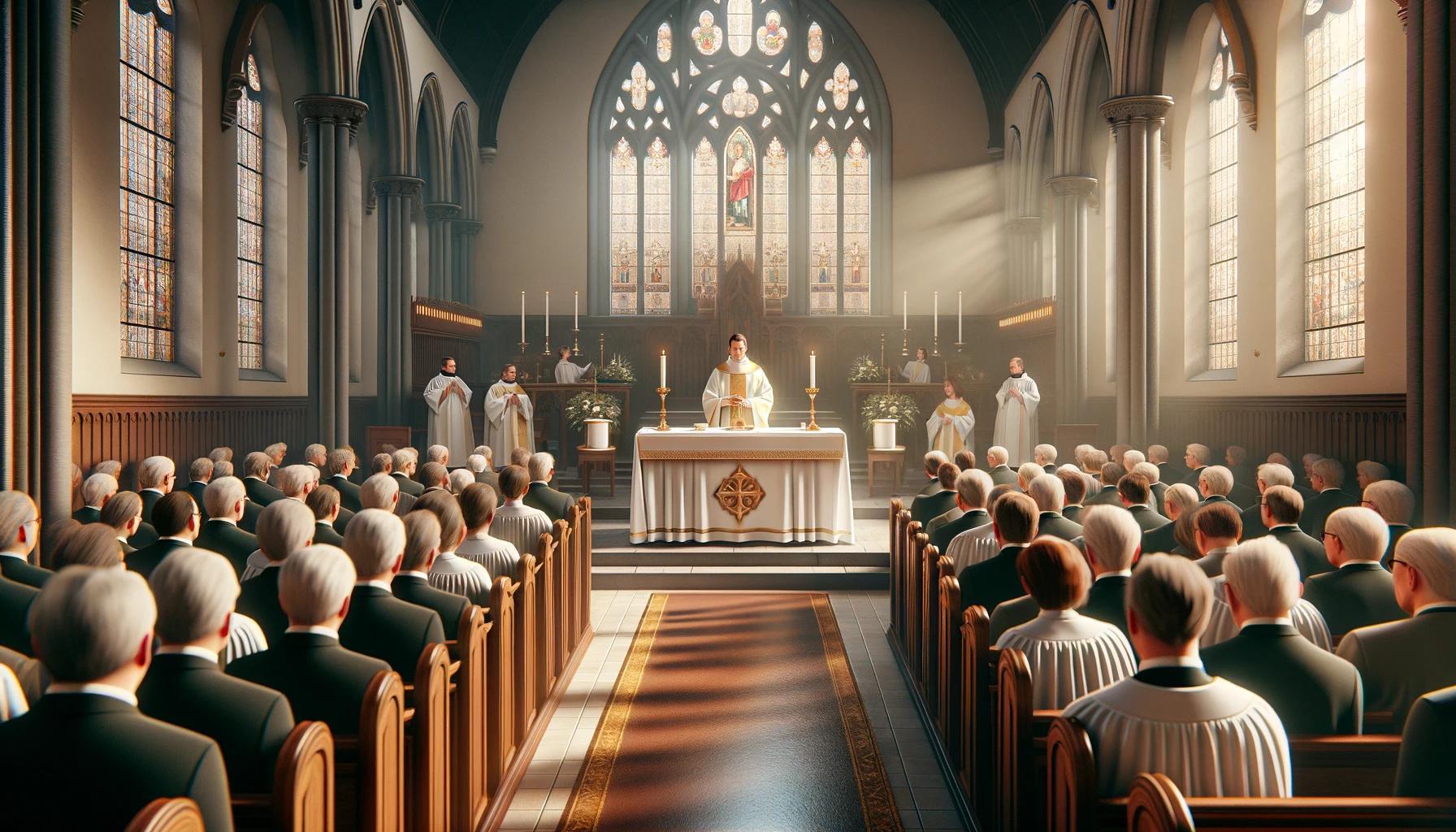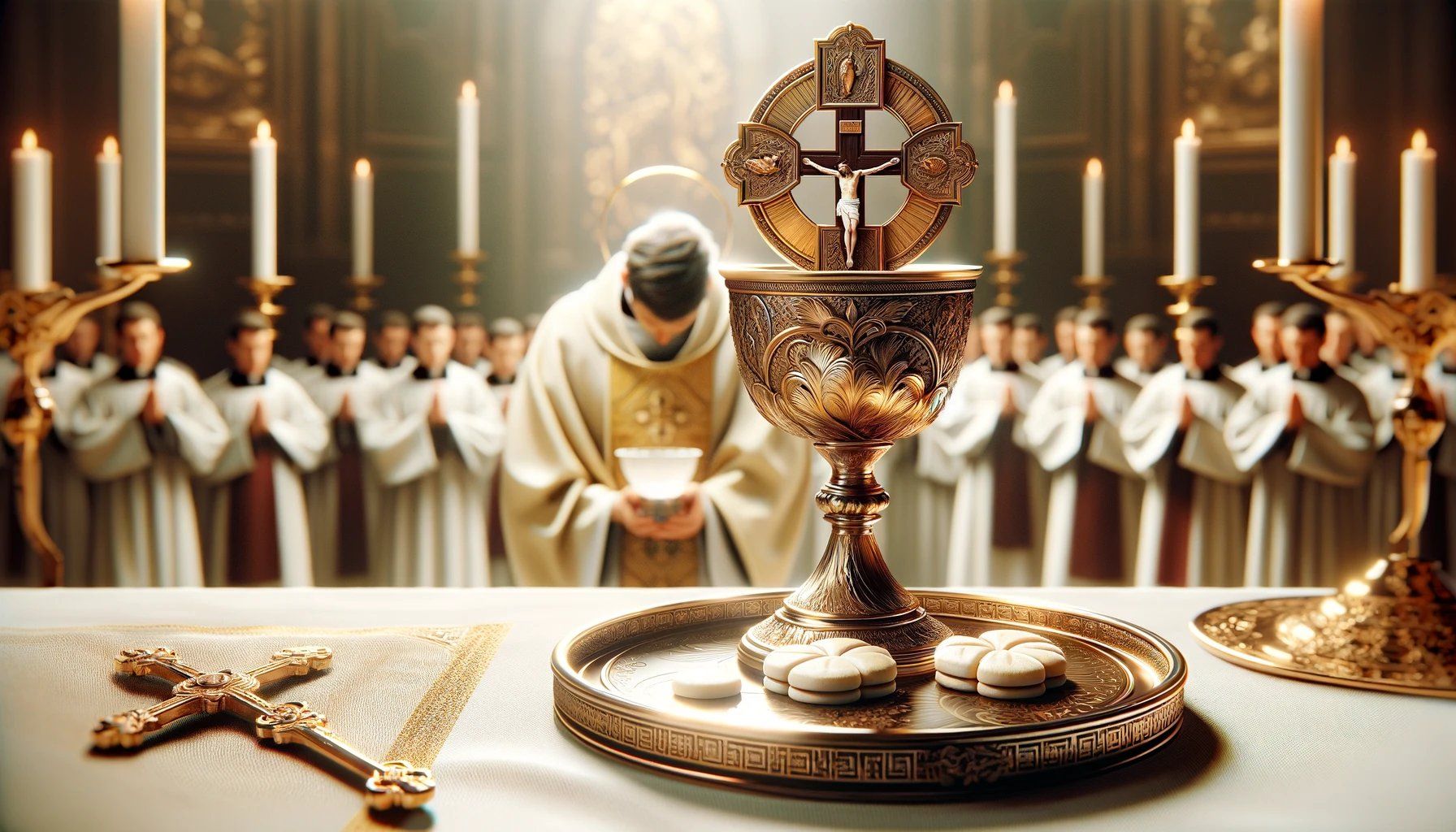Home>Theology and Spirituality>What Is A Communion Service In The Catholic Church?


Theology and Spirituality
What Is A Communion Service In The Catholic Church?
Published: February 25, 2024
Peter Smith, Editorial Director at Christian.net, combines deep insights into faith, politics, and culture to lead content creation that resonates widely. Awarded for his contributions to religious discourse, he previously headed a major organization for religious communicators, enhancing dialogue on faith's societal impacts.
Learn about the significance and traditions of the Communion service in the Catholic Church. Explore its role in theology and spirituality.
(Many of the links in this article redirect to a specific reviewed product. Your purchase of these products through affiliate links helps to generate commission for Christian.net, at no extra cost. Learn more)
Table of Contents
Introduction
The Communion service holds a central place in the spiritual life of the Catholic Church. It is a sacred ritual that symbolizes the profound connection between the faithful and the divine. This article will delve into the significance of communion in the Catholic faith, exploring its historical roots, the structure of the service, and its enduring importance to the faithful.
The communion service, also known as the Eucharist, is a deeply revered sacrament in Catholicism. It represents the spiritual nourishment of the body and soul through the consumption of consecrated bread and wine, which are believed to transform into the actual body and blood of Christ. This act of partaking in the Eucharist is a profound expression of faith and unity within the Catholic community.
Throughout history, the communion service has been a cornerstone of Catholic worship, dating back to the Last Supper, where Jesus shared bread and wine with his disciples, instructing them to continue this practice in remembrance of him. This sacred tradition has been faithfully upheld by the Catholic Church for centuries, carrying with it a rich tapestry of spiritual significance and tradition.
In the following sections, we will explore the deeper meaning of communion in the Catholic Church, tracing its origins and evolution, and shedding light on the profound spiritual significance it holds for the faithful. Join us on this enlightening journey as we uncover the timeless traditions and enduring relevance of the communion service in the Catholic faith.
The Meaning of Communion in the Catholic Church
At the heart of Catholicism lies the profound significance of communion, also known as the Eucharist. This sacred sacrament represents the spiritual nourishment of the body and soul through the consumption of consecrated bread and wine. The Catholic Church teaches that during the Eucharistic celebration, the bread and wine undergo transubstantiation, transforming into the actual body and blood of Christ. This belief is rooted in the teachings of Jesus Christ, who, during the Last Supper, shared bread and wine with his disciples, instructing them to continue this practice in remembrance of him.
The act of receiving communion is a deeply personal and communal experience for Catholics. It signifies a profound union with Christ and fellow believers, reflecting the spiritual nourishment and sustenance derived from the body and blood of Christ. Through this sacred ritual, Catholics believe they are receiving the grace and blessings of Christ, strengthening their faith and deepening their connection to the divine.
Furthermore, communion serves as a powerful symbol of unity within the Catholic community. As believers partake in the Eucharist together, they are reminded of their shared faith and the bond that unites them as members of the body of Christ. This communal aspect of communion reinforces the interconnectedness of the faithful and underscores the importance of collective worship and spiritual fellowship.
In essence, the meaning of communion in the Catholic Church transcends mere symbolism; it embodies the spiritual essence of the Catholic faith. It is a sacred act that encapsulates the profound connection between the faithful and the divine, serving as a source of spiritual nourishment, communal unity, and a tangible expression of faith in the transformative power of Christ's presence.
As we continue our exploration of the communion service in the Catholic Church, we will delve deeper into its historical roots, the structure of the service, and its enduring importance to the faithful. Join us on this enlightening journey as we uncover the timeless traditions and enduring relevance of the communion service in the Catholic faith.
The History of Communion Services
The history of communion services in the Catholic Church is deeply rooted in the origins of Christianity and the teachings of Jesus Christ. The practice of communion, also known as the Eucharist, traces its lineage back to the Last Supper, a pivotal event in Christian theology. During this sacred meal, Jesus shared bread and wine with his disciples, instructing them to partake in these elements in remembrance of him. This profound act of sharing a communal meal with spiritual significance laid the foundation for the Eucharistic tradition within the Catholic Church.
In the early Christian communities, the practice of sharing bread and wine as a remembrance of Christ's sacrifice became a central aspect of worship. As the early Church evolved, the Eucharistic celebration took on a more formalized structure, incorporating prayers, blessings, and specific rituals to consecrate the bread and wine. The concept of transubstantiation, the belief that the bread and wine become the actual body and blood of Christ, gradually gained prominence, shaping the theological understanding of the Eucharist within Catholicism.
Throughout the centuries, the communion service underwent various developments and adaptations, influenced by theological debates, liturgical reforms, and cultural contexts. The Council of Trent in the 16th century reaffirmed the doctrine of transubstantiation, solidifying the Church's stance on the real presence of Christ in the Eucharist. This theological affirmation further underscored the centrality of the communion service in Catholic worship and spirituality.
The rich history of communion services also reflects the diverse cultural expressions and traditions within the Catholic Church. Different rites and liturgical practices have emerged, each contributing to the tapestry of Eucharistic worship. From the solemnity of the Latin Rite to the vibrant traditions of Eastern Catholic Churches, the history of communion services encompasses a spectrum of spiritual expressions that resonate with the faithful across various cultural and geographical boundaries.
In contemporary times, the communion service continues to be a focal point of Catholic worship, embodying centuries of tradition and theological reflection. The history of communion services in the Catholic Church serves as a testament to the enduring significance of this sacred ritual, encapsulating the spiritual journey of the faithful and the timeless bond between the divine and humanity.
As we delve further into the exploration of the communion service, we will uncover the profound structure of the Eucharistic celebration and its enduring importance in the Catholic faith. Join us on this enlightening journey as we unravel the timeless traditions and spiritual depth of the communion service in the Catholic Church.
The Structure of a Communion Service
The structure of a communion service in the Catholic Church is a carefully orchestrated sequence of rituals and prayers, each imbued with profound spiritual significance. The Eucharistic celebration unfolds in a series of distinct yet interconnected elements, culminating in the reception of the body and blood of Christ by the faithful. This sacred structure reflects the rich tapestry of Catholic liturgical tradition and the theological depth of the communion service.
The communion service typically commences with the Liturgy of the Word, during which readings from the Old and New Testaments are proclaimed, accompanied by psalms, prayers, and a homily. This segment of the service serves to illuminate the scriptural foundations of the Eucharist, offering spiritual nourishment through the Word of God. The readings and reflections prepare the faithful for the profound encounter with Christ in the Eucharistic elements.
Following the Liturgy of the Word, the Liturgy of the Eucharist unfolds, marking the pinnacle of the communion service. This segment encompasses the presentation of the gifts, the Eucharistic prayer, and the communion rite. The priest, acting in persona Christi, offers prayers of consecration, invoking the Holy Spirit to transform the bread and wine into the body and blood of Christ. This moment of transubstantiation lies at the heart of the Eucharistic celebration, embodying the real presence of Christ in the sacrament.
The communion rite involves the reception of the consecrated bread and wine by the faithful. As the congregation approaches the altar, they partake in the sacred elements, symbolizing their spiritual union with Christ and fellow believers. The communion rite fosters a profound sense of communal participation and spiritual nourishment, reinforcing the unity of the faithful in the body of Christ.
The communion service culminates in a period of thanksgiving and prayer, expressing gratitude for the spiritual blessings received through the Eucharist. This segment, known as the concluding rite, signifies the culmination of the Eucharistic celebration, sending forth the faithful to embody the transformative grace they have received through communion.
The structured flow of the communion service encapsulates the spiritual journey of the faithful, guiding them through the Word of God, the transformative encounter with Christ in the Eucharist, and the communal expression of gratitude and mission. This sacred structure serves as a profound expression of Catholic faith, uniting the faithful in a timeless ritual that embodies the enduring presence of Christ in the life of the Church.
As we continue to explore the significance of the communion service, we will delve into the enduring importance of communion in the Catholic faith, shedding light on its profound spiritual impact and relevance to the faithful. Join us on this enlightening journey as we unravel the timeless traditions and spiritual depth of the communion service in the Catholic Church.
The Importance of Communion in the Catholic Faith
The communion service, or Eucharist, holds profound significance in the Catholic faith, permeating the spiritual life of believers with its transformative power and enduring relevance. At the core of Catholic theology, communion embodies the real presence of Christ, offering spiritual nourishment, communal unity, and a tangible expression of faith.
First and foremost, communion serves as a source of spiritual nourishment for the faithful. Through the reception of the consecrated bread and wine, Catholics believe they partake in the actual body and blood of Christ, receiving His grace and blessings. This spiritual sustenance strengthens their faith, nurtures their souls, and fosters a deep sense of connection to the divine. The Eucharist is not merely a symbolic ritual but a profound encounter with the living Christ, infusing the spiritual life of believers with transformative grace.
Furthermore, communion embodies the communal unity of the Catholic Church. As believers partake in the Eucharist together, they are reminded of their shared faith and the bond that unites them as members of the body of Christ. This communal aspect of communion reinforces the interconnectedness of the faithful and underscores the importance of collective worship and spiritual fellowship. The Eucharist becomes a powerful symbol of unity, transcending individual experiences and fostering a sense of belonging within the broader Catholic community.
Moreover, the importance of communion extends beyond the walls of the church, shaping the way Catholics engage with the world around them. The spiritual nourishment received through the Eucharist empowers believers to embody the teachings of Christ in their daily lives. It inspires acts of compassion, justice, and service, as the transformative grace of communion compels the faithful to extend Christ's love to others. The Eucharist, therefore, becomes a catalyst for social and moral transformation, guiding Catholics to live out their faith in tangible and impactful ways.
In essence, the importance of communion in the Catholic faith transcends ritualistic observance; it permeates every aspect of the spiritual journey of believers. It is a sacred encounter with the living Christ, a symbol of communal unity, and a catalyst for transformative action in the world. The Eucharist stands as a timeless expression of the enduring presence of Christ in the life of the Church, shaping the faith, unity, and mission of the Catholic community.
As we reflect on the profound importance of communion in the Catholic faith, we are reminded of its enduring impact on the spiritual lives of believers and the collective witness of the Church. Join us in embracing the transformative power of the Eucharist as we continue to explore the timeless traditions and spiritual depth of the communion service in the Catholic Church.
Conclusion
In conclusion, the communion service in the Catholic Church stands as a timeless testament to the enduring presence of Christ in the spiritual life of believers. From its profound significance as a source of spiritual nourishment to its embodiment of communal unity and transformative impact, the Eucharist remains a cornerstone of Catholic faith and worship.
The rich tapestry of the communion service encompasses centuries of tradition, theological reflection, and cultural diversity within the Catholic Church. Its historical roots, dating back to the Last Supper and evolving through the annals of Christian history, underscore the enduring relevance of this sacred ritual. The structured flow of the communion service, from the Liturgy of the Word to the communion rite and concluding thanksgiving, guides the faithful through a profound spiritual journey, culminating in a transformative encounter with the living Christ.
The communion service is not merely a symbolic ritual but a tangible expression of faith, unity, and mission for the Catholic community. It embodies the real presence of Christ, offering believers spiritual nourishment and grace, strengthening their faith and deepening their connection to the divine. Moreover, it serves as a powerful symbol of communal unity, fostering a sense of belonging and interconnectedness among the faithful. The Eucharist transcends the confines of the church, inspiring believers to embody Christ's teachings in their daily lives, thereby becoming agents of positive change and compassion in the world.
As we reflect on the profound importance of communion in the Catholic faith, we are reminded of its enduring impact on the spiritual lives of believers and the collective witness of the Church. The communion service stands as a timeless expression of the enduring presence of Christ in the life of the Church, shaping the faith, unity, and mission of the Catholic community.
In essence, the communion service in the Catholic Church is not merely a ritualistic observance but a transformative and unifying force that resonates deeply with the spiritual journey of believers. It encapsulates the timeless traditions and enduring relevance of the Catholic faith, serving as a beacon of hope, unity, and spiritual nourishment for the faithful across generations.














